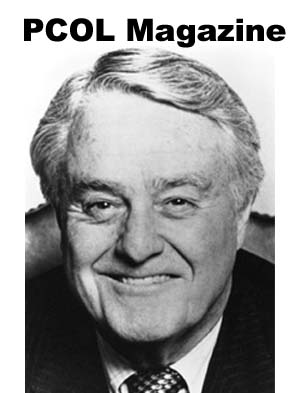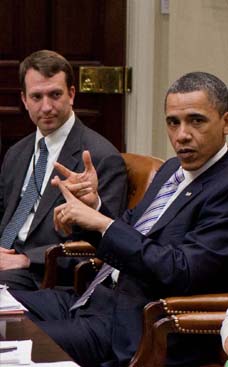
Speaking at the UW Law School, Wofford delivered a historic address in which he portrayed Kennedy as advancing "a vision of a world community, of a world in revolution, of a world in unprecedented economic development, of a world waiting for full American participation, waiting for American leadership to end the Cold War and establish and strengthen the institutions of peace and law. The speech was so powerful that Humphrey wrote a three-word note to his old friend Wofford: "Et tu, Brute." Humphrey knew that Wofford's message was precisely the right one for younger liberals in Madison and around the state. So did Shriver who, according to his able biographer Scott Stossel, was delighted that it had "addressed Kennedy's perceived liberal deficiencies." To amplify the message, Shriver arranged for the Kennedy campaign to reprint the speech as a campaign brochure and to distribute it through the remainder of the campaign. The strategy proved to be a brilliant one, as liberals shifted from Humphrey, providing Kennedy with a convincing 56-44 primary win. After winning the nomination and the presidency, Kennedy embraced elements of the liberal vision outlined in Madison. Shriver became the first director of the agency that, to a greater extent than any other, would champion that vision, the Peace Corps.
John Nichols writes: How Sargent Shriver Helped John Kennedy Become a Liberal
How Sargent Shriver Helped John Kennedy Become a Liberal
John Nichols
January 20, 2011
Sargent Shriver, who has died at age 95, built the left flank of John Kennedy's remarkable 1960 presidential run. In so doing he freed President Kennedy to make critical choices in favor of civil rights and economic justice.
Kennedy was not the most liberal Democrat seeking the presidency that year.
In the Wisconsin primary campaign – the critical first test – the senator from Massachusetts faced Minnesota Senator Hubert Humphrey, a hero of liberals going back to the 1948 Democratic National Convention speech in which he declared: "The time has arrived in America for the Democratic Party to get out of the shadow of states' rights and to walk forthrightly into the bright sunshine of human rights."
As his friend, ally and aide Harris Wofford recalled, "(Shriver) badly wanted Kennedy's nomination to come through liberal support, not through an alliance with southern conservatives." While the young senator was being pulled to the right by many of his allies, "Shriver hoped Kennedy would find himself responding to a convention and a campaign in which the liberal wing gave him decisive support."
To achieve this end, Shriver came to Madison as his brother-in-law Jack's campaign's coordinator in the critical 2nd congressional district. Well aware that Humphrey was a favorite in the region – especially with the liberal community that clustered around the University of Wisconsin campus in Madison -- Shriver set out to build Kennedy's credibility as a liberal.
He turned to Wofford, a former attorney for the United States Commission on Civil Rights who had become a friend and trusted adviser to the Rev. Martin Luther King Jr. An unapologetic and unyielding champion of the civil rights struggle at home and a new internationalism that sought to bridge Cold War divides with a commitment to peace and development, the young man had developed a reputation as a liberal's liberal and supported Kennedy.
He was just what Shriver needed.
Speaking at the UW Law School, Wofford delivered a historic address in which he portrayed Kennedy as advancing "a vision of a world community, of a world in revolution, of a world in unprecedented economic development, of a world waiting for full American participation, waiting for American leadership to end the Cold War and establish and strengthen the institutions of peace and law.
The speech was so powerful that Humphrey wrote a three-word note to his old friend Wofford: "Et tu, Brute." Humphrey knew that Wofford's message was precisely the right one for younger liberals in Madison and around the state. So did Shriver who, according to his able biographer Scott Stossel, was delighted that it had "addressed Kennedy's perceived liberal deficiencies." To amplify the message, Shriver arranged for the Kennedy campaign to reprint the speech as a campaign brochure and to distribute it through the remainder of the campaign.
The strategy proved to be a brilliant one, as liberals shifted from Humphrey, providing Kennedy with a convincing 56-44 primary win. After winning the nomination and the presidency, Kennedy embraced elements of the liberal vision outlined in Madison. Shriver became the first director of the agency that, to a greater extent than any other, would champion that vision, the Peace Corps. Wofford was the associate director. While their official responsibilities were on the international stage, but men served, informally, as liaisons between the civil rights movement and the Kennedy White House.
They also joined the left wing of an administration that was wrestling with the question of how to address poverty in America. After Kennedy read the groundbreaking book The Other America, by socialist Michael Harrington, the groundwork was laid for a war on poverty, which Shriver would lead during the presidency of Kennedy's successor, Lyndon Johnson.
Kennedy was never a perfect liberal.
But his was a liberal presidency, which built the foundations for the domestic liberalism of the 1960s, and the remarkable advances associated with it.
Shriver own accomplishments would extend far beyond the Kennedy-Johnson years, to include a vice presidential run (with George McGovern) in 1972 and a brief presidential run of his own in 1976. But his public life would forever be seen in the context of the family he joined when he married Eunice Kennedy. And there was something very right about this.
After all, it was Shriver's determination to build a liberal base for Kennedy, in Madison and Wisconsin initially, and then nationally, that allowed the young president to win the nation's highest office without having to bow to the southern segregationists and Cold War reactionaries who so defined and damaged the Democratic Party prior to the 1960s.
Shriver political intervention, rooted in an idealism with which he would be so linked as the founding director of the Peace Corps and the command of the War on Poverty, was driven not so much by ambition as by a faith – rooted as much in his Catholicism as his liberalism – that: "The only genuine elite is the elite of those men and women who gave their lives to justice and charity."
It is a faith that may seem unrealistic, perhaps even unimaginable, in this time of so many compromises.
Sargent Shriver died just two days before the 50th anniversary of John Kennedy's January 20, 1960, inauguration as president – an inauguration made possible, in no small part by Shriver's maneuvering in the Wisconsin winter of a year earlier.
It may seem as if a long time has passed, such a long time that we can no longer recognize the vision outlined all those years ago. But Shriver's friend, Dr. King, liked to remind us that the arc of history is long. And he believed, as did Shriver, that it bends toward justice – with a little help from Harris Wofford and a healthy measure of liberal idealism.














